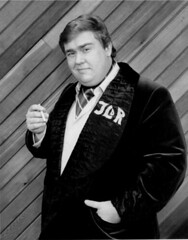 In the underappreciated (and under-watched) movie “Idiocracy,” set 500 years in the future, corporations rule the planet, overlording a feeble-minded populace that believes the corporate pabulum served on their TV screens, letter for letter.
In the underappreciated (and under-watched) movie “Idiocracy,” set 500 years in the future, corporations rule the planet, overlording a feeble-minded populace that believes the corporate pabulum served on their TV screens, letter for letter.
They suffer from garbage avalanches, watch the Masturbation Network (“Helping America with ‘baitin’ for 300 years!”) and a show called “Ow, My Balls!” Their crops do not grow because, instead of water, they are given Brawndo (“The Thirst Mutilator!”), a Gatorade-esque drink that has supplanted H2O. When the hero, who had been frozen since the 21st century, points out that crops need water to grow, the brainwashed populace says, repeating an ad slogan, “But Brawndo’s got what plants crave.”
The future in “Idiocracy” does not, conspicuously, have books. People are too stupid to read.
The Bookfraud household does not, conspicuously, have any books. We are smart enough to read, but am losing that ability in short order.
Our books -- several hundred, if not more, I believe -- are sitting in climate controlled bliss, in a storage unit, where they will reside for the next 16 months while we await any and all life forms residing inside of them to die. In other words, goddamn bedbugs can get inside books, and the only way to make sure they are dead is to pack away one’s volumes for a year and change.
This forced displacement has lowered my I.Q. a good 50 points. All the things that usually make me smarter -- such as wearing my spectacles, which makes me look like a college professor -- have done no good.
In place of the written word, I have been filling my few free hours with the spoken word and the moving image. Unfortunately, this does not mean I have been watching the work of Fellini or Godard, but sophisticated television fare like “Friday Night Smackdown!”
I’ve been reading newspapers and magazines, sure, and the occasional online essay. But nothing that resembles a narrative that lasts more than 10 pages, involves more than 10 characters, and has been published over 10 days ago.
The intellectual and moral complexity of fiction makes you smarter, if you think about it. I mean, think about the intellectual and moral complexity of the novel you’re reading.
Or, a brain without cells
It’s not just the braininess I miss. I miss picking up a volume by Nabokov and randomly picking a page, only to land on a passage of exquisite, lyrical genius. I miss hunkering down on the couch with a heavy book and getting lost. I miss thumbing my way through “Absalom, Absalom!” and trying to figure out what just the hell happened to Thomas Sutpen.
It’s not as if Wife and I hold a literary salon in the living room, or our lives are centered around the written word (though it’s close). But a life without books is incomplete. Like many writers, I was not the most popular fellow among my peers growing up, and I drew solace from books -- science fiction in particular, as the genre traffics in fantastical, engaging universes far removed that the miserable one I inhabited.
Sad to admit, television and sports were the two other passions of my childhood, and if it is not a source of shame that I indulged what many young boys had as hobbies, it’s embarrassing that I couldn’t also say “violin,” “French,” or “something remotely creative.” While television and sports still compete for real estate in the land grab of my brain, it’s books that have sustained me. They help me to engage the world or retreat from it, whichever is necessary.
I don’t want to point a moral compass here -- there’s nothing inherently good about books, just like there’s nothing inherently good about a thing being “natural.”
I am reminded of an anecdote that an English teacher told us when I was a senior in high school. Imagine a room that has a well-stocked library with the greatest literature and philosophy humanity has ever had to offer. There are prints on the walls of great art. The people in the room have access to music from the finest Western composers who ever lived: Bach, Beethoven, Wagner, and many others.
The visitors to the room read the books, study the paintings, listen closely to the music. They debate the merits of the literature and music, confer on aesthetics. They debate what is beautiful and what is art.
The question, my teacher asked, does this necessarily make these people better human beings?
At least the Ramones were pretending to be stupid
Stupid as we were 17, most of us nodded, shrugged our shoulders, said “yes” faintly. Why wouldn't this place make its occupants better, when they can think and talk and read and contemplate the meaning of the world?
Well, the teacher said, the place I'm describing actually existed. It was the officer's lounge at Auschwitz.
Oh.
I have to go. “Ow, My Balls!” is on.
Wednesday, September 12, 2007
D-U-M-B, Everyone's Accusing Me
Subscribe to:
Comment Feed (RSS)


|